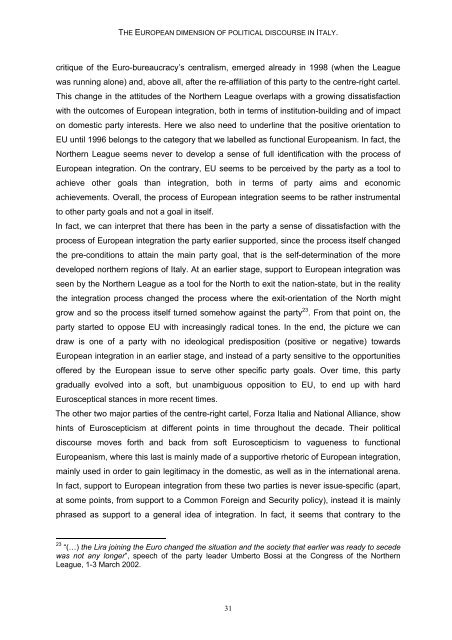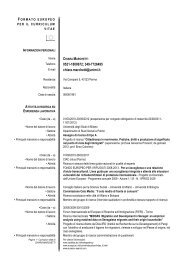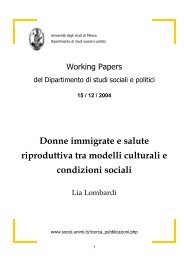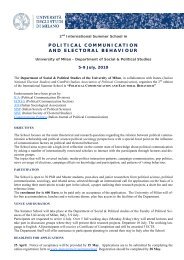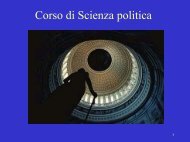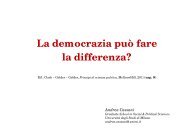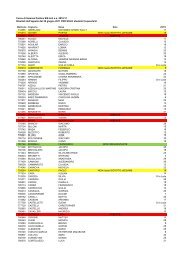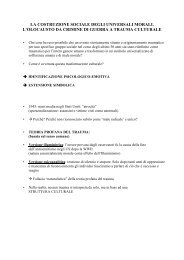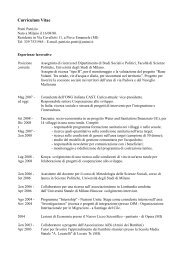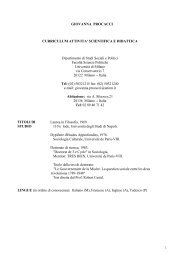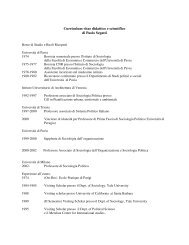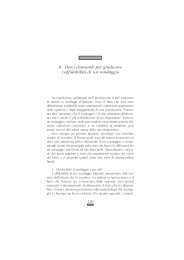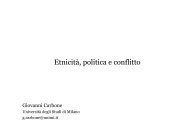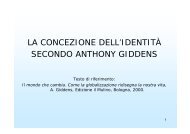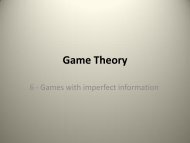The european dimension of political discourse in Italy. A ... - CIRCaP
The european dimension of political discourse in Italy. A ... - CIRCaP
The european dimension of political discourse in Italy. A ... - CIRCaP
You also want an ePaper? Increase the reach of your titles
YUMPU automatically turns print PDFs into web optimized ePapers that Google loves.
THE EUROPEAN DIMENSION OF POLITICAL DISCOURSE IN ITALY.<br />
critique <strong>of</strong> the Euro-bureaucracy’s centralism, emerged already <strong>in</strong> 1998 (when the League<br />
was runn<strong>in</strong>g alone) and, above all, after the re-affiliation <strong>of</strong> this party to the centre-right cartel.<br />
This change <strong>in</strong> the attitudes <strong>of</strong> the Northern League overlaps with a grow<strong>in</strong>g dissatisfaction<br />
with the outcomes <strong>of</strong> European <strong>in</strong>tegration, both <strong>in</strong> terms <strong>of</strong> <strong>in</strong>stitution-build<strong>in</strong>g and <strong>of</strong> impact<br />
on domestic party <strong>in</strong>terests. Here we also need to underl<strong>in</strong>e that the positive orientation to<br />
EU until 1996 belongs to the category that we labelled as functional Europeanism. In fact, the<br />
Northern League seems never to develop a sense <strong>of</strong> full identification with the process <strong>of</strong><br />
European <strong>in</strong>tegration. On the contrary, EU seems to be perceived by the party as a tool to<br />
achieve other goals than <strong>in</strong>tegration, both <strong>in</strong> terms <strong>of</strong> party aims and economic<br />
achievements. Overall, the process <strong>of</strong> European <strong>in</strong>tegration seems to be rather <strong>in</strong>strumental<br />
to other party goals and not a goal <strong>in</strong> itself.<br />
In fact, we can <strong>in</strong>terpret that there has been <strong>in</strong> the party a sense <strong>of</strong> dissatisfaction with the<br />
process <strong>of</strong> European <strong>in</strong>tegration the party earlier supported, s<strong>in</strong>ce the process itself changed<br />
the pre-conditions to atta<strong>in</strong> the ma<strong>in</strong> party goal, that is the self-determ<strong>in</strong>ation <strong>of</strong> the more<br />
developed northern regions <strong>of</strong> <strong>Italy</strong>. At an earlier stage, support to European <strong>in</strong>tegration was<br />
seen by the Northern League as a tool for the North to exit the nation-state, but <strong>in</strong> the reality<br />
the <strong>in</strong>tegration process changed the process where the exit-orientation <strong>of</strong> the North might<br />
grow and so the process itself turned somehow aga<strong>in</strong>st the party 23 . From that po<strong>in</strong>t on, the<br />
party started to oppose EU with <strong>in</strong>creas<strong>in</strong>gly radical tones. In the end, the picture we can<br />
draw is one <strong>of</strong> a party with no ideological predisposition (positive or negative) towards<br />
European <strong>in</strong>tegration <strong>in</strong> an earlier stage, and <strong>in</strong>stead <strong>of</strong> a party sensitive to the opportunities<br />
<strong>of</strong>fered by the European issue to serve other specific party goals. Over time, this party<br />
gradually evolved <strong>in</strong>to a s<strong>of</strong>t, but unambiguous opposition to EU, to end up with hard<br />
Eurosceptical stances <strong>in</strong> more recent times.<br />
<strong>The</strong> other two major parties <strong>of</strong> the centre-right cartel, Forza Italia and National Alliance, show<br />
h<strong>in</strong>ts <strong>of</strong> Euroscepticism at different po<strong>in</strong>ts <strong>in</strong> time throughout the decade. <strong>The</strong>ir <strong>political</strong><br />
<strong>discourse</strong> moves forth and back from s<strong>of</strong>t Euroscepticism to vagueness to functional<br />
Europeanism, where this last is ma<strong>in</strong>ly made <strong>of</strong> a supportive rhetoric <strong>of</strong> European <strong>in</strong>tegration,<br />
ma<strong>in</strong>ly used <strong>in</strong> order to ga<strong>in</strong> legitimacy <strong>in</strong> the domestic, as well as <strong>in</strong> the <strong>in</strong>ternational arena.<br />
In fact, support to European <strong>in</strong>tegration from these two parties is never issue-specific (apart,<br />
at some po<strong>in</strong>ts, from support to a Common Foreign and Security policy), <strong>in</strong>stead it is ma<strong>in</strong>ly<br />
phrased as support to a general idea <strong>of</strong> <strong>in</strong>tegration. In fact, it seems that contrary to the<br />
23 “(…) the Lira jo<strong>in</strong><strong>in</strong>g the Euro changed the situation and the society that earlier was ready to secede<br />
was not any longer”, speech <strong>of</strong> the party leader Umberto Bossi at the Congress <strong>of</strong> the Northern<br />
League, 1-3 March 2002.<br />
31


